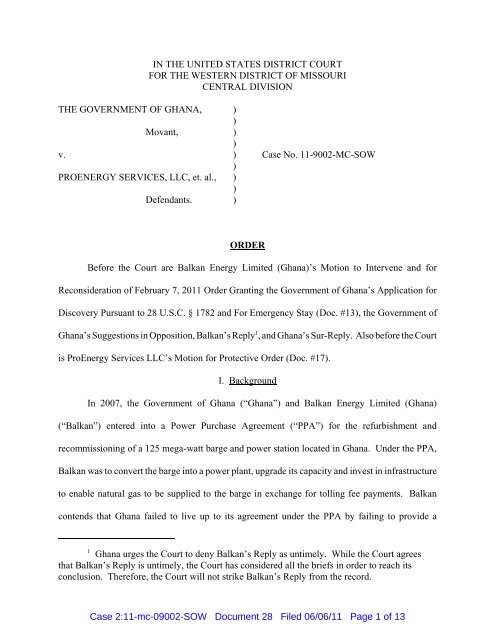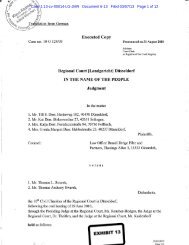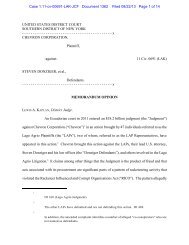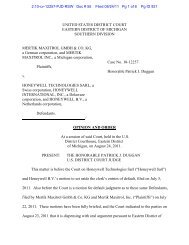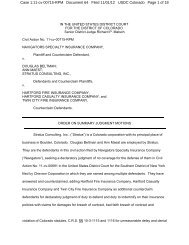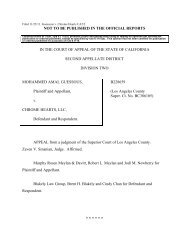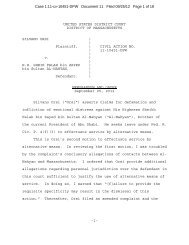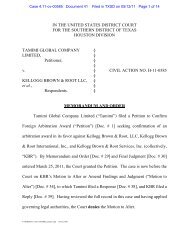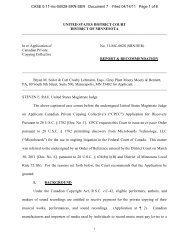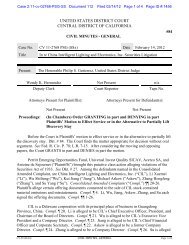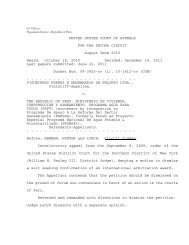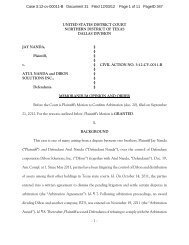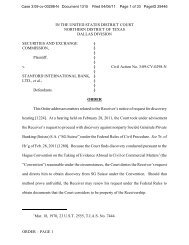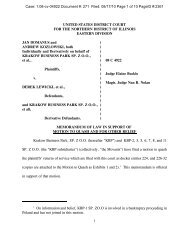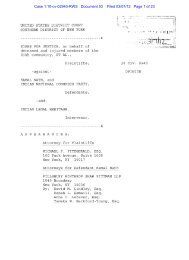Government of Ghana v. ProEnergy Services ... - Letters Blogatory
Government of Ghana v. ProEnergy Services ... - Letters Blogatory
Government of Ghana v. ProEnergy Services ... - Letters Blogatory
You also want an ePaper? Increase the reach of your titles
YUMPU automatically turns print PDFs into web optimized ePapers that Google loves.
IN THE UNITED STATES DISTRICT COURT<br />
FOR THE WESTERN DISTRICT OF MISSOURI<br />
CENTRAL DIVISION<br />
THE GOVERNMENT OF GHANA, )<br />
)<br />
Movant, )<br />
)<br />
v. ) Case No. 11-9002-MC-SOW<br />
)<br />
PROENERGY SERVICES, LLC, et. al., )<br />
)<br />
Defendants. )<br />
ORDER<br />
Before the Court are Balkan Energy Limited (<strong>Ghana</strong>)’s Motion to Intervene and for<br />
Reconsideration <strong>of</strong> February 7, 2011 Order Granting the <strong>Government</strong> <strong>of</strong> <strong>Ghana</strong>’s Application for<br />
Discovery Pursuant to 28 U.S.C. § 1782 and For Emergency Stay (Doc. #13), the <strong>Government</strong> <strong>of</strong><br />
<strong>Ghana</strong>’s Suggestions in Opposition, Balkan’s Reply 1 , and <strong>Ghana</strong>’s Sur-Reply. Also before the Court<br />
is <strong>ProEnergy</strong> <strong>Services</strong> LLC’s Motion for Protective Order (Doc. #17).<br />
I. Background<br />
In 2007, the <strong>Government</strong> <strong>of</strong> <strong>Ghana</strong> (“<strong>Ghana</strong>”) and Balkan Energy Limited (<strong>Ghana</strong>)<br />
(“Balkan”) entered into a Power Purchase Agreement (“PPA”) for the refurbishment and<br />
recommissioning <strong>of</strong> a 125 mega-watt barge and power station located in <strong>Ghana</strong>. Under the PPA,<br />
Balkan was to convert the barge into a power plant, upgrade its capacity and invest in infrastructure<br />
to enable natural gas to be supplied to the barge in exchange for tolling fee payments. Balkan<br />
contends that <strong>Ghana</strong> failed to live up to its agreement under the PPA by failing to provide a<br />
1 <strong>Ghana</strong> urges the Court to deny Balkan’s Reply as untimely. While the Court agrees<br />
that Balkan’s Reply is untimely, the Court has considered all the briefs in order to reach its<br />
conclusion. Therefore, the Court will not strike Balkan’s Reply from the record.<br />
Case 2:11-mc-09002-SOW Document 28 Filed 06/06/11 Page 1 <strong>of</strong> 13
connection to the national grid through proper transmission lines, and further, by failing to pay<br />
necessary fees. Balkan commenced an arbitration proceeding in the Hague against <strong>Ghana</strong>, pursuant<br />
to the PPA. Subsequently, <strong>Ghana</strong> commenced a civil action in the High Court <strong>of</strong> <strong>Ghana</strong> in June<br />
2010 seeking damages for fraud and misrepresentation concerning Balkan’s purported failure to<br />
carry out its obligations under the PPA.<br />
Prior to the Ghanian and Hague proceedings, Balkan Energy Company was engaged in an<br />
action pending in this Court against <strong>ProEnergy</strong> <strong>Services</strong> International, Inc. and <strong>ProEnergy</strong> <strong>Services</strong><br />
LLC (“<strong>ProEnergy</strong>”), the primary subcontractor retained by Balkan on the power plant project. See<br />
<strong>ProEnergy</strong> <strong>Services</strong>, LLC v. Balkan Energy Co., No 2:09-cv-4026, 4030 (W.D. Mo.). There is some<br />
confusion over whether Balkan Energy Company is a separate entity or subsidiary from Balkan<br />
Energy Limited (<strong>Ghana</strong>). Apparently, Balkan Energy Company was misidentified as a Texas<br />
corporation by both parties in the suit that proceeded in this Court, and was never legally formed as<br />
a company. Balkan Energy Company proceeded in this Court as though it was a subsidiary <strong>of</strong><br />
Balkan Energy Limited (<strong>Ghana</strong>). After subsequent briefing, Balkan informs the Court that the work<br />
done on the PPA was done by the “Balkan parties,” suggesting that both Balkans were involved in<br />
work done on the PPA. Balkan suggests that <strong>Ghana</strong> is aware <strong>of</strong> this relationship because the<br />
documents <strong>Ghana</strong> requests from <strong>ProEnergy</strong> defines “Balkan” as follows: “‘Balkan’ refers to Balkan<br />
Energy Company, LLC and Balkan Energy (<strong>Ghana</strong>) Limited, as well as their current former agents,<br />
affiliates, and subsidiaries.” It is readily apparent, however, that <strong>Ghana</strong>’s request seeks information<br />
from both Balkan Energy Company and Balkan Energy Limited (<strong>Ghana</strong>) because it is not clear<br />
whether Balkan Energy Company actually exists. Indeed, Balkan has failed to explain to the Court<br />
whether Balkan Energy Company has ever been legally formed.<br />
-2-<br />
Case 2:11-mc-09002-SOW Document 28 Filed 06/06/11 Page 2 <strong>of</strong> 13
Presently, <strong>Ghana</strong> seeks potentially relevant discovery in possession <strong>of</strong> <strong>ProEnergy</strong> pursuant<br />
to 28 U.S.C. § 1782. The Court initially granted <strong>Ghana</strong>’s application on February 7, 2011. But<br />
Balkan was allowed to intervene on April 29, 2011, in order to allow Balkan the opportunity to<br />
oppose the § 1782 request. After full briefing, the Court will deny Balkan’s motion for<br />
reconsideration.<br />
II. Discussion<br />
Balkan has moved the Court to reconsider its previous Order (Doc. #8) that granted <strong>Ghana</strong>’s<br />
application for discovery pursuant 28 U.S.C. § 1782. In order to grant discovery under 28 U.S.C.<br />
§ 1782, the Court must engage in a two-step analysis. First, the Court must determine whether the<br />
application satisfies the statutory prerequisites and whether the Court has discretion to permit<br />
discovery under the statute. Second, the Court determines whether and how to exercise its<br />
discretion. See Intel Corp v. Advanced Micro Devices, Inc., 542 U.S. 241 (2004).<br />
A. Statutory Requirements<br />
28 U.S.C. § 1782 provides, in pertinent part:<br />
The district court <strong>of</strong> the district in which a person resides or is found may order<br />
him to give his testimony or statement or to produce a document or other thing<br />
for use in a proceeding in a foreign or international tribunal . . . . The order may<br />
be made pursuant to a letter rogatory issued, or request made, by a foreign or<br />
international tribunal or upon the application <strong>of</strong> any interested person and may<br />
direct that the testimony or statement be given, or the document or other thing<br />
be produced . . . .<br />
28 U.S.C. § 1782(a). In Intel Corp. v. Advanced Micro Devices, Inc., the Supreme Court interpreted<br />
the statute as requiring the satisfaction <strong>of</strong> three requirements. 542 U.S. at 246-47, 61. Specifically,<br />
a district court is authorized to assist a foreign or international tribunal or a litigant before such a<br />
tribunal by ordering discovery where: (1) the person from whom discovery is sought resides or is<br />
-3-<br />
Case 2:11-mc-09002-SOW Document 28 Filed 06/06/11 Page 3 <strong>of</strong> 13
found in the district, (2) the discovery is for use in a “proceeding” before a foreign or international<br />
tribunal, and (3) the application is made by a foreign or international tribunal or “any interested<br />
person.” Id. at 246-47, 61; see also Schmitz v. Bernstein, Liebhard & Lifshitz, LLP, 376 F.3d 79,<br />
83 (2d. Cir. 2004). If these requirements are met, the Court is authorized, but not required, to allow<br />
discovery under § 1782. Intel Corp., 542 U.S. at 246-47, 261.<br />
As a threshold matter, the Court finds that these prerequisites have been satisfied. First,<br />
<strong>Ghana</strong> represents, and no party disputes, that <strong>ProEnergy</strong> resides or can be found in the Western<br />
District <strong>of</strong> Missouri. Further, <strong>Ghana</strong>, the party seeking discovery, is an interested person under the<br />
statute.<br />
The only statutory prerequisite that is contested is whether the international arbitration in the<br />
Hague constitutes a “proceeding” under the statute, and further, whether the litigation pending<br />
before the High Court <strong>of</strong> <strong>Ghana</strong> is a “sham,” instigated to circumvent the arbitral process. The Court<br />
addresses the later <strong>of</strong> these two issues first.<br />
Although Balkan vehemently argues that the litigation advanced by <strong>Ghana</strong> in the High Court<br />
<strong>of</strong> <strong>Ghana</strong> is a sham, it has failed to substantiate such an argument. Balkan seeks to prove that the<br />
litigation in the High Court <strong>of</strong> <strong>Ghana</strong> is a sham by asserting that <strong>Ghana</strong> agreed and admitted that the<br />
parties’ dispute must be resolved through arbitration in the Hague. However, this evidence, in and<br />
<strong>of</strong> itself, does not sufficiently show that the Ghanian litigation is a sham. Even if <strong>Ghana</strong>’s actions<br />
seem suspicious, the fact that <strong>Ghana</strong> subsequently instigated proceedings in <strong>Ghana</strong> does not<br />
definitively show that the Ghanian litigation is a sham, and Balkan has provided no case law<br />
suggesting otherwise. Moreover, it is hard to call the Ghanian litigation a sham when the parties are<br />
still actively litigating in that court.<br />
-4-<br />
Case 2:11-mc-09002-SOW Document 28 Filed 06/06/11 Page 4 <strong>of</strong> 13
Balkan also contends that the arbitral tribunal has “denounced” the proceedings in the High<br />
Court <strong>of</strong> <strong>Ghana</strong>. The Court has reviewed the relevant portions from the arbitral tribunal, and finds<br />
Balkan’s argument without merit. There appears only to be the utmost respect between the arbitral<br />
tribunal and the High Court <strong>of</strong> <strong>Ghana</strong>. Further, <strong>Ghana</strong> has presented sufficient evidence that proves<br />
the litigation in <strong>Ghana</strong> is not a sham and that it is being actively litigated. As pro<strong>of</strong>, <strong>Ghana</strong> has<br />
submitted a copy <strong>of</strong> the pleadings from the High Court <strong>of</strong> <strong>Ghana</strong> and relevant pages from the<br />
arbitration tribunal’s Interim Award, both <strong>of</strong> which sufficiently support <strong>Ghana</strong>’s position.<br />
Lastly, Balkan contends that the international arbitration taking place in the Hague does not<br />
qualify as a “proceeding” under the statute and therefore <strong>Ghana</strong> cannot meet the statutory<br />
requirements. But the Court finds that Balkan’s argument is without merit, as Balkan relies on cases<br />
that were determined before Intel Corp v. Advanced Micro Devices, Inc. 2 Courts after Intel have<br />
concluded that an arbitration does in fact constitute a proceeding under § 1782. See, e.g., In re<br />
Application <strong>of</strong> Chevron Corp. Nos 10-MC-208, 10-MC-209, 2010 WL 5173279, at *4 (E.D. Pa.<br />
Dec. 20, 2010) (citing cases in support); accord Intel Corp., 542 U.S. at 528 (tribunal includes<br />
international arbitration tribunals) (quotation omitted). Even if the Court found that the arbitration<br />
tribunal were not a proceeding under the statute, the existence <strong>of</strong> the litigation in <strong>Ghana</strong> would<br />
constitute a proceeding and would alone provide a sufficient basis for the Court to grant <strong>Ghana</strong>’s<br />
request. See Chevron Corp. v. Berlinger, 629 F.3d 297, 310-311 (2d Cir. 2011). Consequently,<br />
having found there is a proceeding, the Court concludes that all the statutory prerequisites are met.<br />
2 See, e.g., NBC v. Bear Stearns, Inc., 165 F.3d 184 (3 rd Cir. 1999); Republic <strong>of</strong><br />
Khazakhstan v. Biedermann Int’l, 168 F.3d 880 (5 th Cir. 1999).<br />
-5-<br />
Case 2:11-mc-09002-SOW Document 28 Filed 06/06/11 Page 5 <strong>of</strong> 13
B. Discretionary Factors<br />
As mentioned, meeting the statutory prerequisites does not end the Court’s inquiry <strong>of</strong><br />
whether to grant <strong>Ghana</strong>’s § 1782 discovery request. The Court retains discretion over whether to<br />
permit the requested discovery. See Intel Corp., 542 U.S. at 260. In the exercise <strong>of</strong> its discretion,<br />
the Court may look to the nature, attitude, and procedures <strong>of</strong> the foreign jurisdiction as useful tools<br />
in making its decision. Schmitz, 376 F.3d at 84 (quoting In re Application <strong>of</strong> Gianoli Aldunate, 3<br />
F.3d 54, 60 (2d Cir. 1993)). The Supreme Court has identified several non-exclusive factors that<br />
a district court may consider in deciding whether to grant an application under § 1782. These<br />
include: (1) whether “the person from whom the discovery is sought is a participant in the foreign<br />
proceeding,” in which case, “the need for § 1782(a) aid generally is not as apparent as . . . when<br />
evidence is sought from a nonparticipant in the matter arising abroad”; (2) the “nature <strong>of</strong> the foreign<br />
tribunal, the character <strong>of</strong> the proceedings underway abroad, and the receptivity <strong>of</strong> the foreign<br />
government or the court or agency abroad to U.S. federal-court judicial assistance”; (3) whether the<br />
request “conceals an attempt to circumvent foreign pro<strong>of</strong>-gathering restrictions or other policies <strong>of</strong><br />
a foreign country or the United States”; and (4) whether the discovery request should be scaled back<br />
to avoid undue burden. Intel Corp., 542 U.S. at 264-65.<br />
Judge Posner <strong>of</strong> the Seventh Circuit Court <strong>of</strong> Appeals has explained recently in the context<br />
<strong>of</strong> a § 1782 case:<br />
Discovery in the federal court system is far broader than in most (maybe all) foreign<br />
countries, and it may seem odd that Congress would have wanted foreign litigants<br />
to be able to take advantage <strong>of</strong> our generous discovery provisions. The stated reason<br />
was by setting an example to encourage foreign countries to enlarge discovery rights<br />
in their own legal systems . . . . That might benefit U.S. litigants in those countries.<br />
And since the foreign court could always exclude the fruits <strong>of</strong> U.S. discovery, it<br />
seemed that allowing such discovery could only help, and not hurt, the foreign<br />
-6-<br />
Case 2:11-mc-09002-SOW Document 28 Filed 06/06/11 Page 6 <strong>of</strong> 13
tribunal . . . .<br />
Haraeus Kulzer, GmbH. v. Biomet, Inc., 633 F.3d 591, 594 (7 th Cir. 2011).<br />
Although the law is straightforward, it is the district court’s job to ensure that potential<br />
abuses do not arise that would warrant a denial <strong>of</strong> an application for discovery. One potential abuse<br />
would be for a party to seek discovery in a federal district court that it could obtain in the foreign<br />
jurisdiction, thus gratuitously forcing his opponent to proceed in two different court systems. Id.;<br />
Cf. Intel Corp., 542 U.S. at 264. Another potential abuse would be for a party to seek discovery <strong>of</strong><br />
documents or other materials that a foreign court would not admit into evidence. Id.<br />
As discussed below, the Court does not believe that either <strong>of</strong> these potential abuses is the<br />
motive behind <strong>Ghana</strong>’s request. To the extent that Balkan or <strong>ProEnergy</strong> claim the discovery sought<br />
is excessive, the Court notes that discovery sought under § 1782 must, in the absence <strong>of</strong> a contrary<br />
order by the Court, comply with Rule 26 <strong>of</strong> the Federal Rules <strong>of</strong> Civil Procedure and other rules<br />
governing discovery in federal courts. The Court now turns to consideration <strong>of</strong> the discretionary<br />
factors enumerated by the Supreme Court in Intel.<br />
1. Whether <strong>ProEnergy</strong> is Subject to the Jurisdiction <strong>of</strong> Foreign Tribunals<br />
Here, <strong>ProEnergy</strong> is a Missouri Limited Liability Company whose principal place <strong>of</strong> business<br />
is located in Sedalia, Missouri. <strong>ProEnergy</strong> is not a party to any <strong>of</strong> the foreign proceedings, and is<br />
not subject to the jurisdiction <strong>of</strong> any <strong>of</strong> the foreign jurisdictions. These facts weigh in favor <strong>of</strong><br />
granting <strong>Ghana</strong>’s application under § 1782 because, as the Supreme Court stated in Intel, the<br />
evidence <strong>of</strong> nonparticipants outside the reach <strong>of</strong> the foreign tribunal’s jurisdiction “may be<br />
unobtainable absent Section 1782(a) aid.” 542 U.S. at 264 (emphasis added).<br />
-7-<br />
Case 2:11-mc-09002-SOW Document 28 Filed 06/06/11 Page 7 <strong>of</strong> 13
2. The Nature <strong>of</strong> the Foreign Tribunals and their Receptivity to the Court’s Assistance<br />
The parties have made no indication that the foreign tribunals are unreceptive to judicial<br />
assistance from United States courts. Parties that apply for discovery under § 1782 enjoy a<br />
presumption in favor <strong>of</strong> foreign tribunal receptivity that can only be <strong>of</strong>fset by reliable evidence that<br />
the tribunal would reject the evidence. See Euromepa S.A. v. R. Esmerian, Inc., 51 F.3d 1095,<br />
1099-1100 (2d. Cir. 1995) (“[W]e believe that a district court’s inquiry into the discoverability <strong>of</strong><br />
requested materials should consider only authoritative pro<strong>of</strong> that a foreign tribunal would reject<br />
evidence obtained with the aid <strong>of</strong> section 1782.”). The intervening party, Balkan, has not provided<br />
the Court with reliable evidence <strong>of</strong> non-receptivity in this case. Even if Balkan could produce<br />
reliable evidence that the arbitration tribunal would reject the evidence, Balkan has not provided the<br />
Court with reliable evidence that the High Court <strong>of</strong> <strong>Ghana</strong> would reject the evidence. Accordingly,<br />
this factor weighs in favor <strong>of</strong> granting <strong>Ghana</strong>’s application.<br />
3. Whether the Applications Attempt to Circumvent Foreign Pro<strong>of</strong>-Gathering Restrictions<br />
Balkan contends that <strong>Ghana</strong> is attempting to circumvent foreign pro<strong>of</strong>-gathering restrictions<br />
because <strong>Ghana</strong> filed suit in the High Court <strong>of</strong> <strong>Ghana</strong>, which Balkan contends amounts to “nothing<br />
more than an end run around the arbitral process in the Hague.” More specifically, Balkan contends<br />
that the UNCITRAL Rules <strong>of</strong> arbitration do not contemplate or allow the type <strong>of</strong> discovery <strong>Ghana</strong><br />
seeks.<br />
In considering Balkan’s argument, the Court must look to “the nature <strong>of</strong> the foreign tribunal,<br />
the character <strong>of</strong> the proceedings underway abroad, and the receptivity <strong>of</strong> the foreign government or<br />
the court or agency abroad to U.S. federal-court judicial assistance.” Intel Corp., 542 U.S. at 264.<br />
The Court may also consider the fact that <strong>ProEnergy</strong> is a non-party to the foreign proceedings, which<br />
-8-<br />
Case 2:11-mc-09002-SOW Document 28 Filed 06/06/11 Page 8 <strong>of</strong> 13
makes it more difficult for the foreign tribunals to reach <strong>ProEnergy</strong>. See In re IKB Deutsche<br />
Industriebank AG, No. 09-cv-7852, 2010 WL 1526070, at *3 (N.D. Ill. Apr. 8, 2010).<br />
The Supreme Court in Intel found that § 1782 does not impose an exhaustion requirement.<br />
Intel Corp., 542 U.S. at 247, 262. In other words, the Court declined to impose a rule precluding<br />
§ 1782 discovery in instances where an applicant would be unable to obtain the requested discovery<br />
in the relevant foreign jurisdiction. Id. The district courts, however, may consider this factor in<br />
deciding whether to exercise their discretion in favor <strong>of</strong> allowing the requested discovery. Id.<br />
No evidence has been presented here suggesting that <strong>Ghana</strong> is attempting to circumvent the<br />
arbitral process in the Hague. Moreover, Balkan has not shown that the arbitral tribunal or High<br />
Court <strong>of</strong> <strong>Ghana</strong> would be unreceptive to the materials discovered under <strong>Ghana</strong>’s § 1782 request.<br />
Therefore, it cannot be said that <strong>Ghana</strong>’s application is an attempt to circumvent foreign pro<strong>of</strong>-<br />
gathering restrictions.<br />
4. Whether the Request is Unduly Intrusive or Burdensome<br />
Lastly, Balkan claims <strong>Ghana</strong>’s discovery request is unduly burdensome or intrusive because<br />
<strong>Ghana</strong> could have “gone to directly to Balkan” to obtain the discovery. Balkan also claims that<br />
<strong>Ghana</strong>’s request is burdensome because <strong>ProEnergy</strong> had to file a Motion for Protective Order and that<br />
Balkan will undoubtedly be unfairly and irreparably prejudiced if the Court’s Order is not vacated.<br />
But, Balkan has failed to clearly explain how it would be burdened or unfairly and<br />
irreparably prejudiced by an order directing a different party to produce documents. Further, the fact<br />
that <strong>ProEnergy</strong> had to file a Motion for Protective Order hardly rises to the level <strong>of</strong> burdensome for<br />
Balkan. <strong>ProEnergy</strong> has already informed <strong>Ghana</strong> that most <strong>of</strong> the requested information is available<br />
electronically and could be readily produced, which further diminishes the strength <strong>of</strong> Balkan’s<br />
-9-<br />
Case 2:11-mc-09002-SOW Document 28 Filed 06/06/11 Page 9 <strong>of</strong> 13
argument.<br />
The Court also finds unpersuasive Balkan’s argument that <strong>Ghana</strong> could have obtained<br />
discovery directly from Balkan. Initially, the Court was curious why <strong>Ghana</strong> could not obtain the<br />
requested information from Balkan in the litigation proceeding in the High Court <strong>of</strong> <strong>Ghana</strong> or the<br />
arbitration tribunal in the Hague, but as <strong>Ghana</strong> points out in its briefing, the Supreme Court and<br />
other federal courts have refused to engraft an exhaustion requirement onto § 1782 that would force<br />
litigants to seek information through a foreign court or from a foreign party before requesting third-<br />
party discovery from a district court under § 1782. See, e.g., Marubeni Am. Corp. v. LBA Y.K., 355<br />
F. App’x 95, 98 (2d Cir. 2009) (citing Intel Corp., 542 U.S. at 261). Further, the Court believes that<br />
further litigation would spawn if the Court denied <strong>Ghana</strong>’s request. This is because Balkan Energy<br />
Company’s existence is somewhat suspect considering that it held itself out as a Texas Corporation<br />
in the case before this Court when in fact it was not legally formed. Consequently, if Balkan Energy<br />
Company is not legally formed, <strong>Ghana</strong> may not be able to obtain the requested information from it.<br />
Balkan’s briefing has not remedied the Court’s concerns regarding the existence <strong>of</strong> Balkan<br />
Energy Company, but has further compounded the issue. Balkan’s briefing neither confirms nor<br />
denies that Balkan Energy Company exists. As it stands, the Court believes that ordering discovery<br />
from <strong>ProEnergy</strong> is the surest way to ensure that <strong>Ghana</strong> obtains the discovery it seeks without forcing<br />
<strong>Ghana</strong> to further litigate the same issues elsewhere. Therefore, the Court finds that <strong>Ghana</strong>’s request<br />
is not unduly burdensome or intrusive.<br />
C. Due Process<br />
Finally, Balkan has alleged that the Court’s Order violates due process because it was issued<br />
pursuant to an ex parte application. This argument is without merit, because it is well-settled that<br />
-10-<br />
Case 2:11-mc-09002-SOW Document 28 Filed 06/06/11 Page 10 <strong>of</strong> 13
the Court has authority to rule on a § 1782 application ex parte. See, e.g., In re Application <strong>of</strong> Esses,<br />
101 F.3d 873, 874 (2d. Cir. 1996); In re Republic <strong>of</strong> Ecuador, No. 1:10-mc-00040 GSA, 2010 WL<br />
4193072, at * 2 (D. Colo. Oct. 20, 2010) (“the Court finds that granting the ex parte application is<br />
appropriate.”). Furthermore, Balkan has been given the opportunity to intervene and voice an<br />
objection to <strong>Ghana</strong>’s discovery request. Therefore, the Court finds its previous Order granting<br />
<strong>Ghana</strong>’s § 1782 request did not violate due process.<br />
After a review <strong>of</strong> the relevant factors, the Court finds that <strong>Ghana</strong>’s § 1782 application should<br />
be granted. Therefore, the Court will deny Balkan’s Motion for Reconsideration.<br />
D. Protective Order<br />
<strong>ProEnergy</strong> has filed a Motion for Protection Order (Doc. #17). <strong>ProEnergy</strong> contends that the<br />
information sought by <strong>Ghana</strong> includes materials which are trade secret, proprietary and confidential,<br />
which include rate sheets, internal pricing guides, and list <strong>of</strong> possible subcontractors which are not<br />
generally known throughout the industry. <strong>ProEnergy</strong> requests that if discovery is ordered, that the<br />
Court limit the discovery to matters exchanged between the parties in the previously litigated case<br />
<strong>ProEnergy</strong> <strong>Services</strong>, LLC v. Balkan Energy Co., No 2:09-cv-4026, 4030 (W.D. Mo.). <strong>ProEnergy</strong>’s<br />
motion was filed, however, without first conferring or attempting to confer with <strong>Ghana</strong>’s counsel<br />
as required by Fed. R. Civ. P. 26(c)(1) and Local Rules 26.1 and 37.1.<br />
The Federal Rules <strong>of</strong> Civil Procedure allow for broad discovery so that parties may gain full<br />
knowledge <strong>of</strong> the issues in the case. Hickman v. Taylor, 329 U.S. 495 (1947). Discovery is as broad<br />
under § 1782 as it is under Fed. R. Civ. P. 26. Thus, if there is a possibility that the discovery sought<br />
-11-<br />
Case 2:11-mc-09002-SOW Document 28 Filed 06/06/11 Page 11 <strong>of</strong> 13
may lead to information relevant to the subject matter <strong>of</strong> the action, then the discovery should<br />
generally be allowed. Fed. R. Civ. P. 26(b)(1). With this standard in mind, the Court will order<br />
<strong>ProEnergy</strong>’s counsel and <strong>Ghana</strong>’s counsel to confer in good faith regarding the discovery requested.<br />
The Court notes that it has reviewed <strong>Ghana</strong>’s requests and believes they are both relevant and<br />
discoverable. The parties should address two issues: (1) whether a protective order is needed and,<br />
if so, <strong>ProEnergy</strong> shall specifically identify those documents it claims are proprietary, confidential,<br />
or trade secret, and (2) identify what discovery, if any, <strong>Ghana</strong> requests that was not produced<br />
between <strong>ProEnergy</strong> and Balkan in <strong>ProEnergy</strong> <strong>Services</strong>, LLC v. Balkan Energy Co., No 2:09-cv-<br />
4026, 4030 (W.D. Mo.). Should the parties fail to reach a resolution, the Court will schedule a<br />
telephone conference as a last resort.<br />
Accordingly, it is hereby<br />
III. Conclusion<br />
ORDERED that Balkan Energy Limited (<strong>Ghana</strong>)’s Motion to Intervene and for<br />
Reconsideration <strong>of</strong> February 7, 2011 Order Granting the <strong>Government</strong> <strong>of</strong> <strong>Ghana</strong>’s Application for<br />
Discovery Pursuant to 28 U.S.C. § 1782 and For Emergency Stay (Doc. #13) is denied. 3 It is further<br />
ORDERED that <strong>ProEnergy</strong>’s counsel and <strong>Ghana</strong>’s counsel confer in good faith regarding<br />
the discovery requested, and inform the Court within ten (10) days <strong>of</strong> the date <strong>of</strong> this Order whether<br />
the parties have reached a resolution. It is further<br />
3 The Court already allowed Balkan to intervene (see Doc. #24); therefore, this Order<br />
only pertains to Balkan’s motion for reconsideration and for emergency stay.<br />
-12-<br />
Case 2:11-mc-09002-SOW Document 28 Filed 06/06/11 Page 12 <strong>of</strong> 13
ORDERED that <strong>ProEnergy</strong> <strong>Services</strong> LLC’s Motion for Protective Order (Doc. #17) is denied<br />
without prejudice.<br />
DATED: June 6, 2011<br />
/s/ Scott O. Wright<br />
SCOTT O. WRIGHT<br />
Senior United States District Judge<br />
-13-<br />
Case 2:11-mc-09002-SOW Document 28 Filed 06/06/11 Page 13 <strong>of</strong> 13


